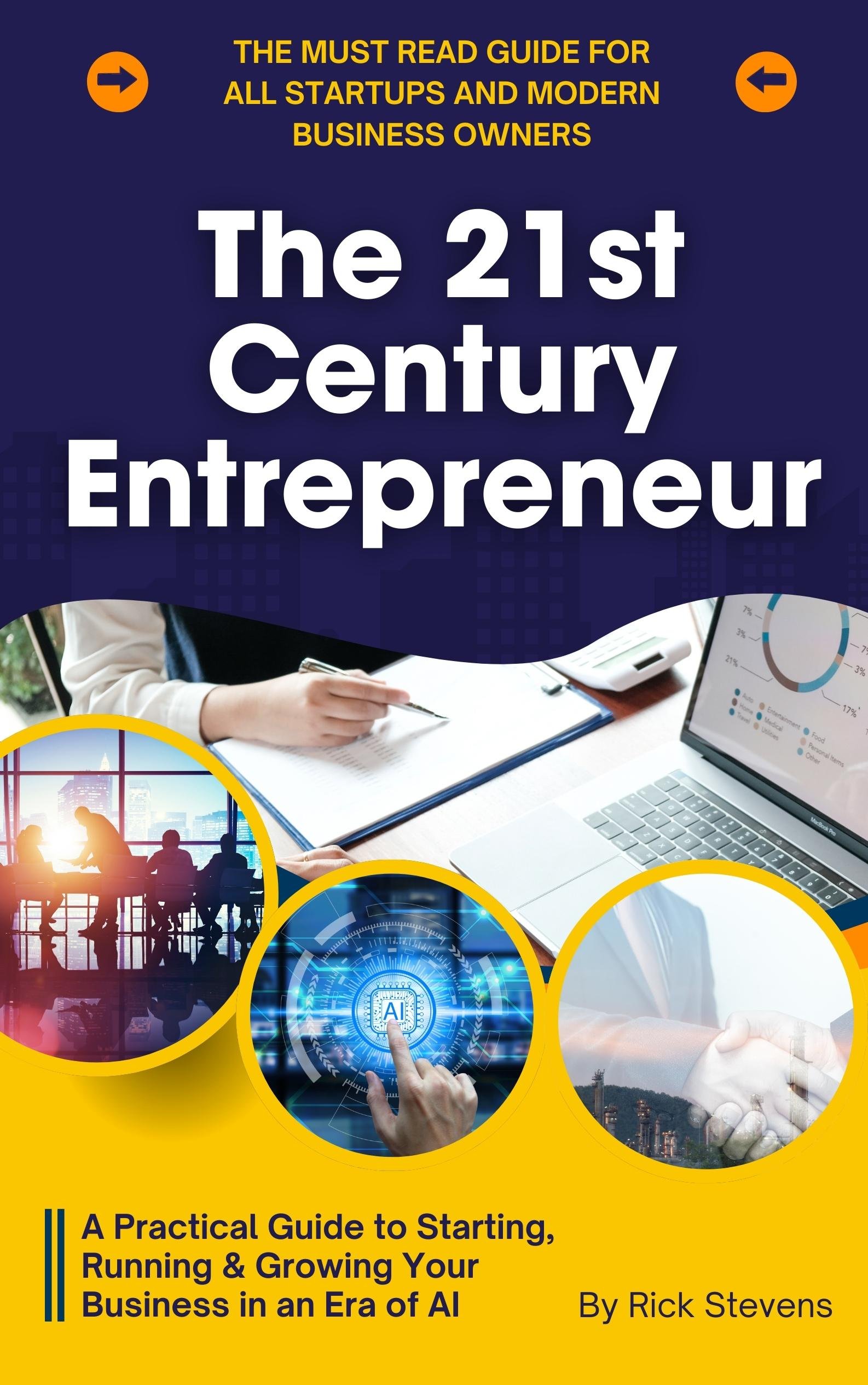Are you tired of working for someone else and dream of being your own boss? Starting your own business can be a thrilling and rewarding journey, but it’s crucial to have a clear roadmap to success. In this comprehensive guide, we will take you through the essential steps of turning your idea into a thriving business.
Rick Stevens has launched his new book The 21st Century Entrepreneur which is arguably one of the best business startup books to read if you are thinking of starting a business in 2025 because it combines 3 decades of business startup experience with the very latest strategies to harness modern technology, especially AI to give you a competitive edge in starting your new venture. Here are some of the key things to keep in mind if you are thinking of starting a business in this exciting era filled with opportunity and possibilities.
From identifying a profitable niche to creating a solid business plan, we’ll show you how to lay the foundation for a successful venture. We’ll also dive into the legal and financial aspects of business ownership, helping you navigate through the complexities of registrations, licenses, and funding options.
But starting a business is not just about paperwork and numbers. It’s also about branding, marketing, and creating a memorable customer experience. We will explore effective strategies to build your brand identity, engage with your target audience, and maximize your online presence.
Whether you’re a budding entrepreneur or have already taken the first steps, this guide will equip you with invaluable insights and practical tips to set you on the path to entrepreneurial success. Get ready to turn your idea into a thriving business!

Starting a Business Begins With Identifying Your Business Idea
The first step in starting your own business is identifying a viable idea that resonates with your passions and has the potential for profitability. This process begins with introspection; consider your skills, interests, and experiences. What are you passionate about? What problems do you frequently encounter that you feel compelled to solve? By exploring your personal strengths and interests, you can uncover unique ideas that not only excite you but also fill a gap in the market.
Once you have a list of potential ideas, it’s essential to evaluate them critically. Think about the feasibility of each concept. Is there a significant demand for your product or service? Are there existing solutions, and if so, how can you improve upon them? The goal here is to find a niche that not only aligns with your passions but also has a solid customer base. This initial filtering process will help you focus your energy on the most promising ideas.
Finally, don’t hesitate to seek feedback from friends, family, or industry experts. Present your ideas to them and gauge their reactions. Sometimes, an outside perspective can provide valuable insights or help refine your concepts further. Engaging with potential customers through informal surveys or social media can also validate your ideas, ensuring there is a market appetite for what you’re considering.
Market Research and Competitor Analysis – Fundamental in starting a business
Starting a business is much more than having an idea and opening up the shop. Once you have identified a business idea, the next crucial step is conducting market research and competitor analysis. This phase involves gathering data about your potential market, understanding customer demographics, preferences, and behaviours. Use surveys, interviews, and online research to paint a comprehensive picture of who your customers are and what they need. The more detailed your understanding, the better equipped you will be to tailor your offerings to meet those needs effectively.
Additionally, analysing your competitors is equally important. Identify businesses that are already operating in your chosen niche and evaluate their strengths and weaknesses. Look at their marketing strategies, customer engagement tactics, and product offerings. This competitive analysis will help you discern where your business can stand out. What unique value proposition can you offer that differentiates you from the competition? Understanding the competitive landscape will provide insights that enable you to position your business strategically.
Armed with this information, you can make informed decisions about how to proceed. Market research will not only guide your product development but also inform your marketing strategies. Knowing what resonates with your target audience allows you to craft messages that speak directly to their needs and desires, setting the stage for a successful launch.
Creating a Business Plan is an Essential Part of Business Startup

With a solid idea and market research in hand, the next step in starting a business is creating a comprehensive business plan. A well-structured business plan serves as a roadmap for your entrepreneurial journey, outlining your goals, strategies, and the steps you will take to achieve success. Start with an executive summary that encapsulates your vision, mission, and what makes your business unique. This section should be concise yet compelling, capturing the essence of your venture.
Following the executive summary, delve into the details of your business model. Describe your products or services, your target market, and your marketing strategy. This is also the section where you’ll discuss your sales strategy, pricing, and distribution channels. Be thorough in your analysis, as potential investors or lenders will scrutinize this part of your business plan to gauge the viability of your venture.
Lastly, include financial projections and funding requirements in your business plan. Detail your startup costs, projected revenue, and break-even analysis. When you are starting a business it can be tempting to create your business plan with the ever optimistic enthusiasm that you feel but it is important to keep your feet on the ground and be realistic, especially if you are seeking finance. Show the challenges and weaknesses but also how you plan to overcome them. This financial section is crucial for attracting investors and securing loans. Being realistic and transparent about your financial forecasts can build trust with potential stakeholders and demonstrate that you have a clear understanding of the financial landscape your business will navigate.
Financing Your Business Startup: Funding Options and Resources
Financing your new business is a critical component of your entrepreneurial journey, and there are various funding options available to help you get started. Personal savings are often the first source of capital for many entrepreneurs. This self-funding approach allows you to maintain full control over your business without incurring debt or giving away equity. However, it’s essential to ensure that you have adequate reserves to cover your personal expenses during the initial months of operation.
If personal savings aren’t sufficient for your business startup, consider other funding options such as loans from financial institutions, grants, or crowdfunding. Traditional bank loans usually require a solid business plan and collateral, while grants can provide non-repayable capital, though they often come with specific eligibility criteria. Crowdfunding platforms like Kickstarter or Indiegogo enable you to present your business idea to a large audience and raise small amounts of money from many individuals, which can be an effective way to gauge interest in your product.
Another route to consider is seeking out investors. Angel investors and venture capitalists can provide substantial funding in exchange for equity in your company. This option not only brings in capital but also valuable expertise and networking opportunities. Whichever funding avenue you choose, it’s vital to have a clear financial strategy and to understand the implications of each option on your business in the long run. This is all discussed in more depth in the starting a business book which you can buy now on Amazon.
Registering Your Business: Legal and Regulatory Requirements
Navigating the legal landscape is a crucial step in starting your own business. Registering your business not only legitimizes your operations but also protects your personal assets. Start by selecting a business structure that suits your needs, whether it’s a sole proprietorship, partnership, LLC, or corporation. Each structure has its own legal and tax implications, so it’s advisable to consult with a legal or financial expert to determine the best fit for your situation.
Once you’ve chosen a structure, you’ll need to register your business name with the appropriate government authorities. This typically involves checking the availability of your desired name and filing the necessary paperwork. Depending on your location and the nature of your business, you may also need to obtain specific licenses or permits. Researching these requirements is crucial to ensure compliance and avoid potential legal complications down the line.
In addition to registration, don’t overlook the importance of setting up proper accounting practices and understanding tax obligations. This may involve hiring an accountant or investing in accounting software to keep your finances organized. Being proactive about legal and regulatory requirements will not only help you avoid fines and legal issues but will also give you a solid foundation for your business operations.
Building Your Team: Hiring, Outsourcing, and Partnerships
As your business begins to take shape, you will inevitably need to build a team that shares your vision and complements your skills. Hiring the right people is critical for the success of your venture, so take the time to create a clear job description and identify the qualities you seek in potential candidates. Look for individuals who not only possess the necessary skills but also align with your company culture and values. A cohesive team can significantly enhance productivity and morale.
In some cases, outsourcing specific tasks may be a more efficient solution than hiring full-time employees. Consider outsourcing functions such as accounting, marketing, or IT support to specialized firms or freelancers. This approach can save costs while still ensuring that critical business functions are managed effectively. Platforms like Upwork or Fiverr can help you find qualified freelancers who can contribute to your project on a flexible basis.
Partnerships can also play a vital role in your business growth. Collaborating with other businesses or entrepreneurs can provide additional resources, expertise, and networks that can accelerate your success. Whether it’s co-marketing efforts, joint ventures, or strategic alliances, partnerships can open doors to new opportunities and expand your reach in the market. Building a strong team, whether through hiring, outsourcing, or partnerships, is essential for scaling and sustaining your business.
One important caveat is that when you are starting a business don´t go in guns blazing appointing people to do jobs that you can do yourself or use modern technology to do for you. In the book The 21st Century Entrepreneur Rick Stevens gives practical tips for how many things can be simplified with the use of AI in this day and age. Keep your costs low when starting a business and grow at a sustainable rate.

Developing Your Product or Service
With your team in place, the focus shifts to developing your product or service. This stage requires a blend of creativity, technical skill, and a keen understanding of your target market. Begin by creating a prototype or a minimum viable product (MVP) that embodies your idea. This version doesn’t have to be perfect but should encapsulate the core features that solve customer problems. The goal is to create something tangible that you can test and gather feedback on.
Once you have a prototype, initiate a feedback loop with your target audience. Conduct testing sessions, surveys, or focus groups to gather insights on what works and what needs improvement. This iterative process will help you refine your offering based on real user experiences, ensuring that your final product aligns with customer expectations. A well-developed product that resonates with your audience can be a significant competitive advantage in the market.
Additionally, consider the logistics of product development. If you’re manufacturing a physical product, research suppliers, production timelines, and quality control processes. For services, outline the delivery mechanisms and customer experience you want to create. Planning these elements in advance will streamline your operations and help you scale effectively once you launch your business.
Marketing and Branding Your Business
Once your product or service is ready, it’s time to shift your focus to marketing and branding. Establishing a strong brand identity is essential for creating recognition and trust among your target audience. Begin by defining your brand’s mission, vision, and values. What do you stand for, and how do you want to be perceived by your customers? This foundational work will guide all your branding efforts, from visual elements like logos and color schemes to the tone of voice in your communications.
Effective marketing strategies are crucial for attracting and retaining customers. Leverage a mix of digital marketing channels, including social media, email marketing, content marketing, and search engine optimization (SEO). Each platform offers unique opportunities to connect with your audience, so tailor your approach based on where your customers spend their time. For instance, a visually-driven business may benefit from platforms like Instagram, while a B2B service may find success on LinkedIn.
Finally, don’t underestimate the power of customer engagement. Building relationships with your audience through personalized communication, exceptional customer service, and loyalty programs can lead to repeat business and positive word-of-mouth marketing. Encourage feedback and actively engage with your customers on social media and other platforms. A strong community around your brand can foster loyalty and advocacy, driving your business forward.
Launching and Scaling Your Business
The launch phase of starting a business is an exhilarating yet challenging time for any entrepreneur. It’s essential to have a well-thought-out launch plan that outlines your marketing strategies, promotional events, and customer engagement tactics. Consider hosting a launch event, whether virtual or in-person, to create buzz around your business. This event can be a great opportunity to showcase your product or service, engage with potential customers, and generate initial sales.
Once your business is launched, the focus shifts to scaling. Analyse your initial sales data and customer feedback to identify areas for improvement and growth. Are there additional features or services that customers are requesting? Is there an opportunity to expand into new markets or demographics? Use this information to inform your scaling strategy, whether it involves expanding your product line, enhancing your marketing efforts, or exploring new sales channels.
Keep in mind that scaling requires careful planning and resource management. Ensure that your operations can handle increased demand without sacrificing quality or customer satisfaction. This may involve investing in new technology, hiring additional staff, or optimizing your supply chain. By anticipating growth and planning accordingly, you can position your business for long-term success.
Conclusion: The Keys to Entrepreneurial Success in Starting a Business
Starting a business and becoming your own boss is a rewarding journey filled with challenges and opportunities. By following the essential steps outlined in this guide, from identifying your business idea to launching and scaling your venture, you are laying the groundwork for entrepreneurial success. Remember that resilience, adaptability, and continuous learning are crucial traits for any entrepreneur.
As you navigate the complexities of business ownership, surround yourself with a supportive network of mentors, peers, and advisors. Their experiences and insights can provide invaluable guidance as you face inevitable obstacles along the way. Stay committed to your vision, remain open to feedback, and be willing to pivot when necessary.
In conclusion, entrepreneurship is not just about making money; it’s about creating value, solving problems, and making a difference in the world. Embrace the journey, stay passionate about your mission, and keep your focus on delivering exceptional products or services. With determination and the right strategies in place, you can turn your idea into a thriving business that not only fulfils your dreams but also positively impacts the lives of others.
Fins out more about Rick Stevens business books including the 21st Century Entrepreneur – an essential read for anyone thinking of starting a business by clicking here.





